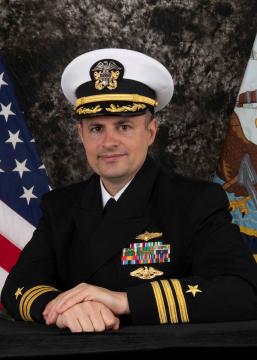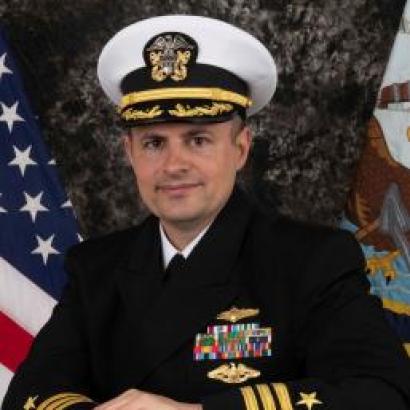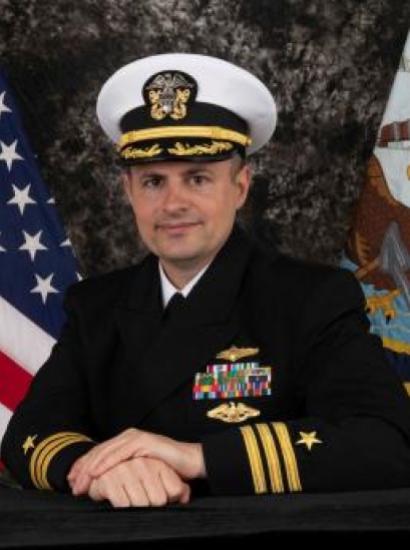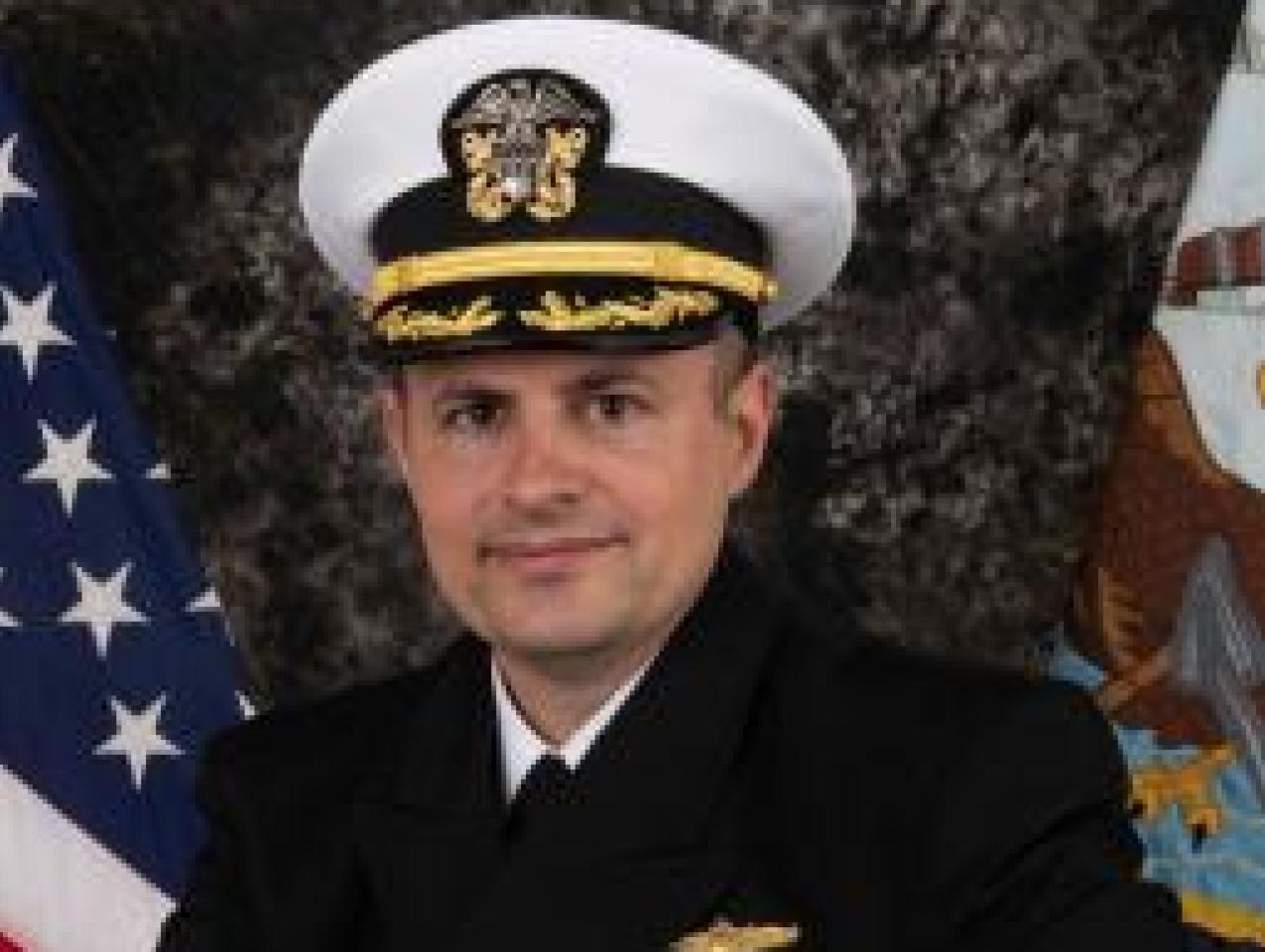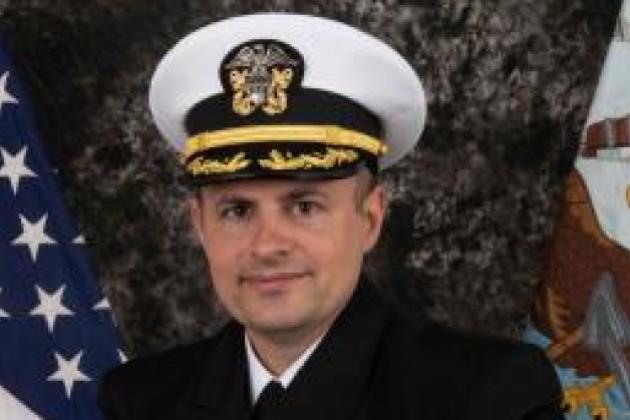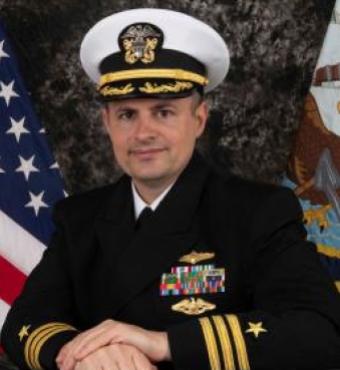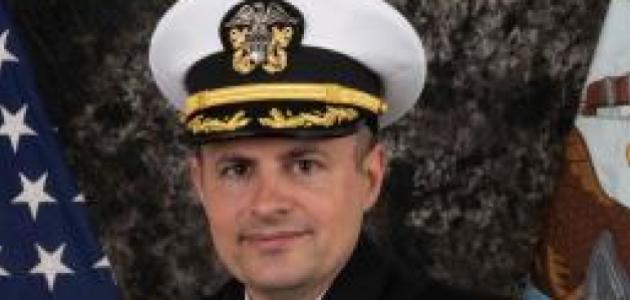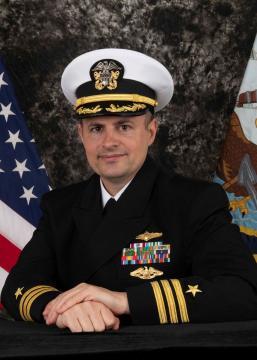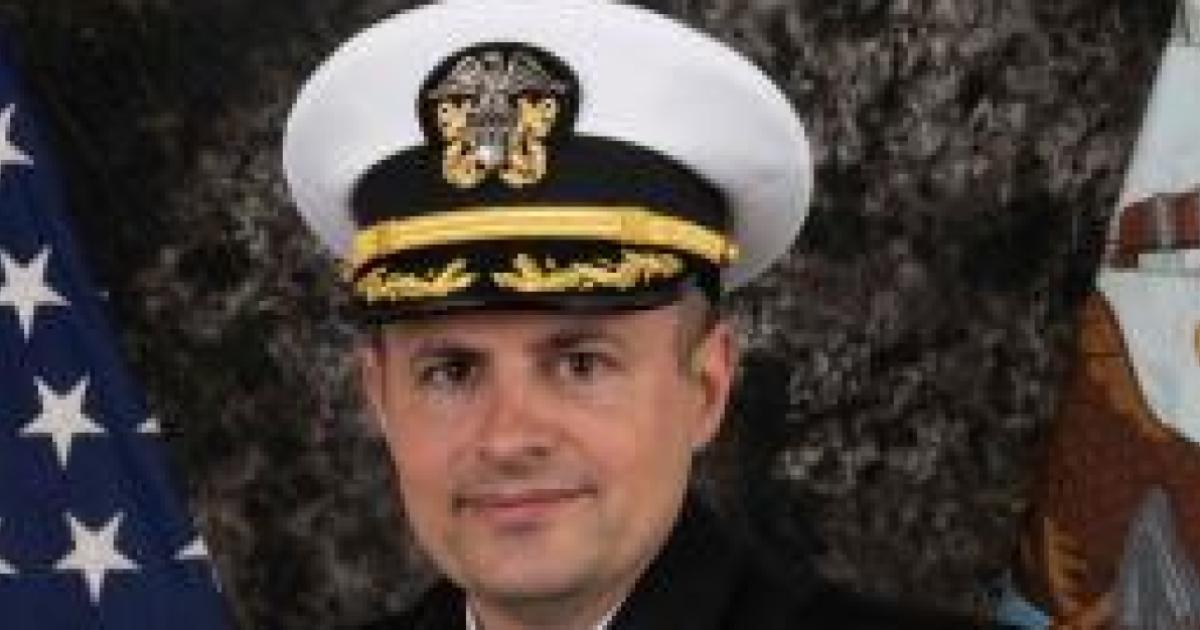The opinions expressed here are those of the author and do not reflect those of the US Navy or Department of Defense.
Commander Bart D’Angelo, of the US Navy, is a National Security Affairs Fellow for the academic year 2022–23 at the Hoover Institution.
In this interview, D’Angelo discusses his career, more than two decades long, as an intelligence officer, from his initial tour on the aircraft carrier USS Carl Vinson to his work providing battlespace awareness to fleet commanders.
D’Angelo also describes his dual research focus at the Hoover Institution during his fellowship year. He plans to devote a considerable amount of time learning what factors are driving the national security decision making of the Chinese Communist Party. In addition, he plans to learn more about what may be the most credible strategies in deterring a potential People’s Republic of China (PRC) invasion of Taiwan.
Finally, D’Angelo affirms that the world is experiencing a clash of ideologies between the democracy and rule of law heralded by the United States and the authoritarian style-governance championed by the PRC. He argues that these conflicting worldviews can’t coexist in a stable international system.
Why did you decide to join the US Navy?
Bart D’Angelo: I was inspired to join the US Navy while attending the US Merchant Marine Academy (USMMA). It's a small school in Kings Point, New York, on Long Island that is run by the US Department of Transportation. The school teaches you how to sail merchant ships, either as an engineer or a deck officer. During World War II, USMMA was established so that the country would always have a ready stock of sailors to deliver weapons and logistics equipment across oceans in support of our forces.
The condition for enrollment and free tuition is a commitment to maintain a mariner’s license for ten years, serve in the US Navy Reserve for eight years, and join the maritime industry. Alternatively, these requirements can be waived by joining an armed service, which I did by becoming a US naval officer.
I always say that I found the back door to intelligence. If I had attended the US Naval Academy or ROTC, I would have been required to serve as an unrestricted line officer in the navy, which means a surface warfare, aviation, special warfare, or submarine officer. Since we are a Department of Transportation school and not in the Department of Defense, I could join any community of the navy.
Had I tried to join naval intelligence from a conventional university, the navy would have made me apply for a position through Officer Candidate School (OCS). Intelligence is one of the most desired jobs in the navy, with many more OCS applications than openings. A saying I hear often from navy intelligence officer accessions is, “It’s harder to get into the navy as an intelligence officer than to become an admiral in the navy just by joining as any other officer.”
Luckily for me, I found the back door, because there were three slots available at USMMA, and only two people applied. Ironically, it was an accident that I attended the Merchant Marine Academy in the first place. I really wanted to go to the US Military Academy at West Point and join the army. As a youth, I was inspired by stories of knights during medieval times and the importance of honor. I thought that I could capture that ethos by joining the military.
My local congressman from the Buffalo, New York, area nominated me to attend West Point. But since I was five-feet-five-inches, with a weak upper body, I didn’t pass the physical fitness tests, which entailed throwing a basketball over my head while kneeling. From this position, I couldn’t throw the ball far enough. It was kind of frustrating at the time, as I was a decent athlete and a varsity hockey player, but now it’s a pretty amusing story.
Subsequently, I was able to pass a fitness test for USMMA, I accepted that nomination, and the rest is history. Looking back at my career experiences, I am grateful the army didn’t work out for me.
Will you tell us about your educational background?
Bart D’Angelo: Aside from the Merchant Marine Academy, I attended the Naval Postgraduate School (NPS), based in Monterey, California, and the Naval War College in Newport, Rhode Island. I took my NPS coursework virtually while stationed in Hawaii in 2011 and received an executive MBA. I took the standard course at the War College and received an additional master’s in strategic studies.
Will you describe the nature of your work as a US naval intelligence officer?
Bart D’Angelo: My first assignment was on the aircraft carrier USS Carl Vinson, based out of Bremerton, Washington. I did two years total, and a nine-and-a-half-month Western Pacific deployment on that ship. It was a great start to my naval career. I was a mentee to now rear admiral Thomas Henderschedt, who is currently the director for intelligence, US Indo-Pacific Command. He was the first person who taught me the intricacies of operational intelligence (OPINTEL) work.
The US Navy greatly values OPINTEL. On a carrier, intelligence officers stand watch in a small dark room called SUPPLOT, illuminated by blue lights that are designed to help you see better. That may be true, but it just made me sleepy. Regardless, all the real-time intelligence is funneled through this one room. Assisted by three to four other sailors, the job of the intelligence officer is to make time-critical indication and warnings to the strike group commander. This entails alerting the commander to such events as an airplane taking off, an inbound enemy warship, or a missile launch.
Intelligence officers don’t detect activity using the ship’s radar or other organic sensors, which the commander receives from tactical action officers. We are looking at all available nonorganic government sensors at our disposal, including satellite and other data provided by agencies like the NSA, CIA, or NGA. We then assemble this data in near-real time and use it to inform the ship’s sensors, make predictions, and pass it up the chain of command. This is the bread and butter of navy OPINTEL.
In addition to standing watch in SUPPLOT, my job on the USS Carl Vinson was as the intelligence systems officer, which meant that I made sure all the intelligence systems were working properly.
Following this tour, I had multiple assignment opportunities. When I joined the US Navy, my goal was to be deployed overseas and see the world. The intelligence detailer, who assigns officers to duty stations, first offered me an assignment in South Korea. However, I turned it down because the nature of the job was human intelligence (HUMINT), which is to gather information through conversations and interviews with human subjects. I wasn’t interested in that type of work. The other job I was offered, and I accepted, was with Submarine Group 7 (Commander Task Force 54/74) in Yokosuka, Japan, which commands all the submarines from the International Date Line to the Suez Canal. My job was to provide intelligence on enemy submarines, including their location and what types of operations they were engaged in. I was assigned there for two years but left after only eighteen months, as the navy, recognizing the importance of the position, converted the billet from a lieutenant to a commander. For those unfamiliar with navy rank structure, this is two ranks higher and ten to fifteen years more experience.
Overseas moves are expensive, and with only eighteen months in Japan, the navy decided to keep me in-country, and I transferred to Commander Task Force (CTF) 72 in Misawa, on the northern part Honshu, the largest Japanese island. Winters are cold there, with a lot of snow, a lot like my hometown of Buffalo. CTF 72 is a maritime surveillance command, which oversees submarine hunting and reconnaissance aircraft. At the time this was the P-3 Orion, but these aircraft have now all been replaced by the P-8 Poseidon.
From Japan, I went to Pacific Fleet (PACFLT) headquarters in Honolulu, Hawaii. So, you can see a trend that my assignments have focused on US challenges in the Pacific. I was in Honolulu for three or four years and, as I mentioned earlier, received a master's while working there. The duties were what one would expect from being assigned to headquarters. You are part of a machine churning out intelligence analysis for the commanders so that they can make informed decisions.
Following PACFLT, I worked on a carrier strike group staff for two years, providing intelligence to an admiral commanding a carrier and escort ships. This was the exact position that Admiral Henderschedt had served in when he mentored me a decade prior!
After attending US Naval War College in Newport, Rhode Island, I was assigned to the Defense Combating Terrorism Center, at the Defense Intelligence Agency. For two years, I conducted counterterrorism intelligence analysis, which is HUMINT intensive, and a type of intelligence work I am not very fond of. We monitored terrorist activity, which was difficult to predict because the subjects attempted to communicate with one another without using cellphones or other electronic devices. A lot of information came from informants or interrogation of enemy combatants. It was difficult to receive reliable information on imminent attacks, for example, because in many cases these sources were second- or thirdhand and either lying or misdirecting us. It was important work, but I was happy when it was over.
I went from there to spend two years at North American Aerospace Defense Command (NORAD) / US Northern Command (NORTHCOM) in Colorado Springs, Colorado. NORAD has the responsibility to defend against enemy aircraft and missile attacks, including the use of civilian airliners as a weapon. We drilled daily on such scenarios to prevent another tragedy like 9/11. I was also part of the nuclear response team that drilled on what to do in the event of a nuclear missile strike. What I learned was that no one wins from the use of nuclear weapons. Why would one ever think about using nuclear weapons? I understand their necessity, but we’ve already lost if they’re used.
Following NORAD/NORTHCOM, I returned to Japan and an assignment to Seventh Fleet, which commands all things US Navy between the International Date Line and India. I was a deputy for intelligence and information warfare and was able to use the skills gained in my many previous assignments to the Pacific to provide awareness to the commander and shape the intelligence activities of the fleet.
After twenty-one years, I am now a National Security Affairs Fellow at the Hoover Institution.
What will be your research focus during your year at the Hoover Institution?
Bart D’Angelo: I am mostly reading about the contention between the PRC and Taiwan. How we deal with the PRC is the most critical issue to American national security. We are living amid a clash of civilizations, between the West and its democratic ideas and the PRC’s authoritarian model of governance, or as they call it, “socialism with Chinese characteristics.” I don’t believe these two ideologies can coexist while intertwined in the same international order.
I want to read a diverse set of opinions on this issue, so that I can do my job better in the future. My role as an intelligence officer is to provide the best information possible to my commanders, so that they can make optimal decisions.
What factors do you consider when evaluating the behavior of the PRC?
Bart D’Angelo: My goal is to get smarter about the PRC, period. That includes a better understanding of its philosophy and how that influences its decision making.
One of the biggest problems we have in intelligence is falling into the fallacy of mirror imaging. Just because the US Navy would take a course of action doesn’t mean we can predict that the PRC navy would do the same.
Consider the Korean War. General Douglas MacArthur thought there was no way that the Chinese would cross the Yalu River into North Korea. Yet they did. Why did he make that mistake? Perhaps he believed that, like us, Chinese military leadership would not sacrifice the large number of troops that would be needed to push Allied forces back. In the end, however, they accepted casualty rates estimated as three to ten times that of the United States in the Korean War and successfully achieved their objective.
Another issue that I would also like to study is the effectiveness of U.S. military deterrence actions near China. Does what we are currently doing actually deter adversaries, or will it result in unnecessary backlash?
This is a very delicate balance. For example, I believe that in general, freedom of navigation operations (FONOPs) are positive. US freedom of navigation operations are designed to protest maritime claims that are excessive under international law. When we sail within twelve nautical miles (the limits of a nation’s territorial waters) of PRC’s manmade islands in the South China Sea, it makes a lot of sense. According to international law, this is not PRC territory. The PRC signed the United Nations Convention on the Law of the Sea (UNCLOS) treaty, and the PRC lost arbitration on these islands through UNCLOS proceedings. On the other hand, some of our FONOPs challenge less controversial claims that do not necessarily have the approval of our allies and partners. We want to be fair and balanced in our protests while not damaging international support against the most egregious claims.
In this vein, I would like to write a paper on how we can formulate more appropriate deterrence strategies, which demonstrate we have the capacity and will to fight, but not take any action that is unnecessarily antagonistic or would appear to be so.
Is there anyone from the Hoover fellowship who has made you think differently about the topics that you are studying?
Bart D’Angelo: I have spoken with Kharis Templeman. He was one of the members of the thirteen-person Hoover delegation that visited Taiwan in August. One of the wildcards in a potential cross-strait conflict is whether or not Taiwan has the willingness to defend its country like Ukraine has against Russia. I personally believe that Taiwan will put up a strong defense, but right now that’s based only on an uneducated opinion. It is great to get the views of people like Kharis who are experts in the region. One thing that I learned from him is that Taiwan has a very favorable view of Japan. I was a little surprised to hear this, because I am familiar with the Japanese rule of Taiwan in the early 20th century.
What does leadership mean to you?
Bart D’Angelo: Leadership is motivating people to do things they otherwise would not do on their own. Motivation is key because it’s not the same as threatening someone if they don’t follow orders. Convincing someone it’s in their best interest to do something delivers the best results. The people that can do that are those that I want to follow, and that’s the kind of leader I want to be.







